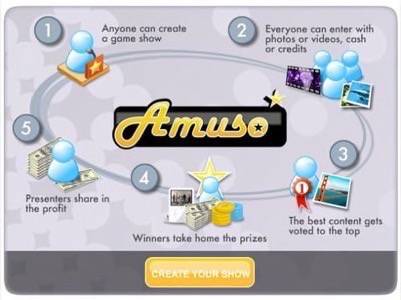I am usually the “enterprise guy”, so game shows – the space that Amuso is in – is way off my beat. I explained that to the PR person who persistently tracked me down at Web 2.0 Expo in New York. But I am pleased she persisted.

While I still know nothing about game shows (I don’t even have a TV at home), there is something intriguing about Amuso at a business model level. Amuso may be a good example of that rare breed of startup that is both viral and monetizable.
How Does The Game Show Quadrant Look?
The rule of thumb is: “The more viral it is, the harder it is to monetize”.
For example, Communication services such as Twitter and Hotmail are perfect for viral adoption but hard (not impossible, but hard) to monetize. They maybe great businesses, scale first and monetize later can be a great game plan if you have plenty of funding. But they are certainly hard to monetize.
What about Entertainment? YouTube is perfect for viral, but has monetization issues. Traditional entertainment is simple to monetize – you create something that people want and charge them for it – but is only viral as a bye-product of occasionally creating a great hit that everybody talks about.
Amuso says they are in the magic quadrant at the top right hand corner that is both viral and monetizable. Let’s look at that a bit closer, poke around in the magic numbers.
How Amuso Works
In this case a picture says it all…

Parsing The Amuso Model
Here is the basic deal: user generated game shows.
COMPETE
Enter photo and video contests to show off your talent.
VOTE
Support your favorite entries and invite friends to come vote for yours.
WIN!
Win the most votes with your entries and take home the prizes!
Contestants want to get famous and make money from prizes. Who are they: Next Top Models, Pop Idols, Comedy Kings and more.
The “community” breaks down as follows:
10% Contestant
90% Members/Voters
Amuso takes a share of the prize money.
It Looks Like It Might Be Working
After only two months, Amuso has already attracted 100,000 monthly visitors, 20,000 registered contestants and paid out over $10,000 in cash prizes.
That is good traction by most start-up standards.
Investors Who Funded Skype
The founders are two ex-Yahoo!-ers, Jordi Bartomeu, CEO and Barak Rabinowitz. They told me that their investors had been investors in Skype. Which means that the investors have done well and understand how to get viral growth. For more on Skype investors see this old blog post from 2005.

















